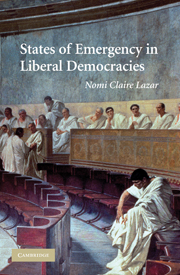Book contents
- Frontmatter
- Contents
- Acknowledgments
- States of Emergency in Liberal Democracies
- 1 The Problem of Emergency
- 2 Must Exceptionalism Prove the Rule?
- 3 Two Concepts of Liberalism
- 4 Are Rights Derogations Always Wrong?
- 5 The Rule of Law and the Roman Dictatorship
- 6 The Norms of Crisis Government
- Bibliography
- Index
5 - The Rule of Law and the Roman Dictatorship
Published online by Cambridge University Press: 15 September 2009
- Frontmatter
- Contents
- Acknowledgments
- States of Emergency in Liberal Democracies
- 1 The Problem of Emergency
- 2 Must Exceptionalism Prove the Rule?
- 3 Two Concepts of Liberalism
- 4 Are Rights Derogations Always Wrong?
- 5 The Rule of Law and the Roman Dictatorship
- 6 The Norms of Crisis Government
- Bibliography
- Index
Summary
Concentration of power is a standard feature of crisis government. Because this kind of emergency provision is often conceptualized as a mitigation of the rule of law in favor of individual or arbitrary rule, here, too, norms and exceptions are a common but blunt conceptual tool. Conceptualizing the problem of emergency powers as a problem of the rule of law (normal) contra arbitrary or individual rule (exceptional) rests on the premise that this dichotomy constitutes a mutually exclusive and collectively exhaustive account of power, which implies an unwarranted solidification of power and institutions. No state is purely ruled by law. States are only more or less under the rule of law. And a state under even the most extreme constitutional emergency powers is never entirely subject to the sovereign will of an individual, as Carl Schmitt implies is possible. Institutions confer formal powers, but institutions and laws are among a number of means of constraining the informal flow of power. Hence, any normative account of emergency powers that aims at safely optimizing liberal democratic values under emergency conditions will have to set aside norms/exceptions, and instead contend with this more complex and continuous landscape of risk and enablement.
Now, the Roman dictatorship is a favorite trope of scholars of emergency government, widely cited but ill understood. It is purported to be the paradigm of this dichotomous shift to a state of exception in constitutional regimes.
- Type
- Chapter
- Information
- States of Emergency in Liberal Democracies , pp. 113 - 135Publisher: Cambridge University PressPrint publication year: 2009

